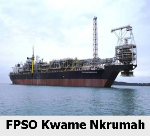The Managing Director of BOST, Mr Kingsley Kwame Awuah Darku, said the move had become necessary to save a failing strategic national asset from collapsing.
BOST has signed a one-year agreement with TSL Logistics Ghana Limited, a subsidiary of a Nigerian company, to manage its Accra Plains Depot on a pilot basis.
Speaking at a media briefing in Accra Wednesday, Mr Awuah Darku said contrary to reports, the bulk distribution companies (BDCs) did not have the capacity to perform the role for which the TSL had been engaged.
The TSL, he explained, was not a BDC but rather a company that specialised in terminal management.
He said that notwithstanding, “BDCs are important stakeholders in our business, and it is our desire and vision that the kind of BOST that we will deliver in the next few months, the BDCs will come out and thank the Almighty God and the management and board for the efficiency that we will inject into BOST”.
According to him, the TSL was authorised by the National Petroleum Authority (NPA) to operate in the country.
Background
Even before the agreement was signed, there were backstage attempts to foil it, which failed but that did not quiet the controversy between BOST and some BDCs and the Ghana Chamber of Bulk Oil Distributors (GCBOD) now, Mr awuah Darku said.
The Chief Executive Officer of GCBOD, Mr Senyo Hosi, at a press conference last week, called for the suspension of the deal but that appeared to be too late.
Mr Awuah Darku, therefore, indicated that BDCs interested in the contract should prepare and apply after the expiration of the 12 months given the Nigerian company.
Rationale for engaging TSL
“All BOST facilities operationally have become anaemic, suffering from ineffective inventory management, poor maintenance of existing facilities, high risk health, safety and environmental management, and low morale among staff”, Mr Darku stated and explained that its deal with TSL was, therefore, to reinvigorate the company which had been grappling with operational and financial challenges.
The country requires at least a six-week reserve which is 356,000 metric tons.
“In spite of that, BOST’s total capacity is below that which means that we have to plan for the future to make sure there is allowance in capacity. We have to increase our capacity by doubling it between now and 2016 bearing in mind we have to support the Sahalian market with our infrastructure”, he stated.
“In September, 2013, there was so much trauma in BOST such that BDCs refused to take products into the BOST system.
“Infact, the situation was so bad that the BDCs were prepared to pay $14 per metric ton with the private sector tank farms than pay $9 with BOST. That is the kind of BOST we are trying to transform,” Mr Darku stated.
Currently, only 27 per cent of BOST’s $1 billion capacity is operational, Mr Darku said, adding that the new management and board had a plan to progressively increase the capacity of BOST from its current capacity to about 95 per cent by 2015.
Objectives of the restructuring
A successful implementation of BOST-TSL deal, according to Mr Darku would stabilise the price of petroleum products across the country.
He said, it would also improve the country’s reserve and prepare it against shortages.
Writer’s email: This email address is being protected from spambots. You need JavaScript enabled to view it.







 The Bulk Oil Storage and Transportation (BOST) Company has explained that its decision to outsource the management of its petroleum storage facilities within the Accra Plains Depot to a private company is in the interest of the nation.
The Bulk Oil Storage and Transportation (BOST) Company has explained that its decision to outsource the management of its petroleum storage facilities within the Accra Plains Depot to a private company is in the interest of the nation.